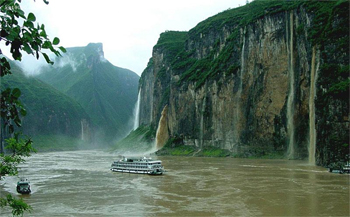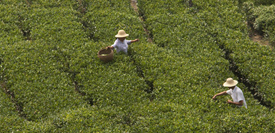 A project inserting terraces and drainage has boosted production where soil has been severely eroded along the flood-prone Yangtze River, offering a possible solution to the bigger problem of China’s Three Gorges.
A project inserting terraces and drainage has boosted production where soil has been severely eroded along the flood-prone Yangtze River, offering a possible solution to the bigger problem of China’s Three Gorges.
As Chinese officials set about trying to repair the environmental damage that the Three Gorges Dam has caused around the reservoir’s edge, a simple but effective project just downstream could model a solution to the mammoth problem.
By merely building sturdy terraces and digging well-placed drainage channels and ponds, hydraulic engineers have radically reduced soil erosion and water loss in this village and others like it, boosting farmers’ crops and helping them make more money.
“My corn did not grow so well when my land sloped,” recalls Liu Gang, surveying his newly built terraces, green with leafy cornstalks. “Now [since the terraces] I harvest almost half again as much as I used to.”
 The farm terraces and ponds that dot Yiling County, where the Three Gorges Dam is located, are part of an effort funded by the World Bank, the European Union, and the Chinese government stretching up and down the Yangtze River to better manage its watershed.
The farm terraces and ponds that dot Yiling County, where the Three Gorges Dam is located, are part of an effort funded by the World Bank, the European Union, and the Chinese government stretching up and down the Yangtze River to better manage its watershed.
Soil and water loss plague farmers in many parts of China, but in few places is the problem as critical as it is around the Three Gorges Reservoir, behind the dam.
Peasant farmers forced by the reservoir’s rising waters to cultivate steep slopes farther up the mountainside have worsened erosion, sending millions of tons of soil coursing down the mountains every year when it rains. The resulting silt raises the level of the Yangtze riverbed, not only reducing the life of the dam, but also worsening the risk of floods.
The water that runs off the hillsides, meanwhile, also increases peak river flows, eroding the banks and raising the risk of landslides. And more soil in the river means less on the land, which means poorer farmers.
The Chinese government pledged recently to solve the Three Gorges project’s environmental problems and to make resettled farmers more prosperous, even if they now have less land.
Read the rest of this article at: The Christian Science Monitor Online>>